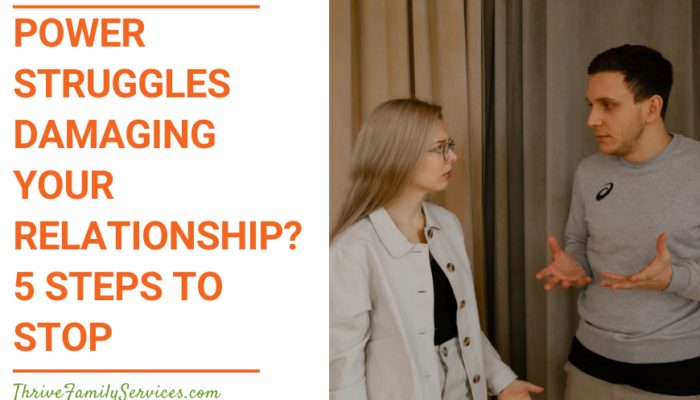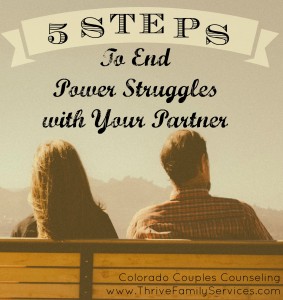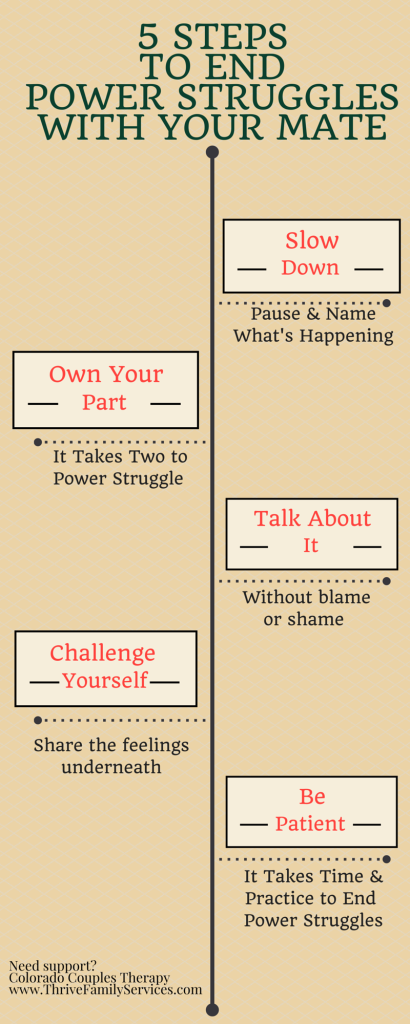Letting Go of Power Struggles
Do you get into power struggles with your partner? Do you sometimes care more about being right and proving your partner wrong than reconciling the argument?
This power struggle can feel frustrating, helpless and become toxic in a relationship, especially when it begins to form a negative cycle that repeats. In our Denver Couples Counseling practice, we help lots of stuck in pointless power struggles begin to communicate more effectively.
Scroll below for our 5 Steps to End Power Struggles.
Whose fault is it?
When couples get stuck in the content of what happens (dishes, laundry, picking up the kids, cleaning, work, money etc.)- it is very tempting to find “the bad guy”.
Whose fault is it that the kids were late to school? Whose fault is it that the appointment wasn’t made to fix the dryer? Whose fault is it that the savings has been drained?
You may blame your partner for these mistakes.
However, instead of stating the facts of the situation that one partner is upset about, it is easy to associate this with the character of their partner. You might start to tell yourself some scary stories about what’s going on.
What’s behind the power struggles?
Here’s what that scary story might sound like: “The kids were late to school because you don’t prioritize us. You just don’t care about this family. You’re a terrible father.”
This turns the mistake into a fault of the partner. Rather than respond with care, your partner can feel hurt and begin to build resentment toward you.
In the end, you have an argument erupt and a gap that builds between you.
Why do you get into power struggles?
The reason is simple. It is often easier to blame your partner than to ask for what you need or share our underlying feelings. Most of us don’t have any problem showing or talking about feelings like anger or disappointment.
But, to ask for what we need in a soft way can feel like a scary thing to do. It can also feel quite scary to express the underlying feelings like hurt, worry, loneliness, etc. Compare how risky it would be to say the angry things above vs. these:
“I was upset when the kids were late to school. I start to worry that it happened because the kids and I don’t matter to you. That would hurt me so much. Then I start to get overwhelmed by the idea of doing it alone, of not having the equal partnership I want where we can share responsibilities. I need you.”
This softer response allows space for your partner to hear the real need and feelings you’re having.
Instead of getting defensive or shutting down, your partner is more likely to respond to your hurt, correct your misconceptions and offer a caring response where you could feel your partner being there for you.
What’s the cost of always being right?
The problem with a power struggle is that no one wins.
We all make mistakes, slack off, or get off track.
Ruptures are inevitable.
How we talk about them leads either to a fight or a repair.
Conflict always escalates when couples get in a power struggle. When you or your partner feel attacked, you become defensive, inviting defensiveness from the other. With both of you defending, the argument can quickly get heated.
Worst Case Scenario – Contempt
Sometimes, arguments get so critical that one of you attacks the other’s character. This is called “contempt.” John Gottman, a popular marriage and family therapist and author, has found repeated contempt to be one of the strongest predictors of divorce.
When you’re power struggling, your relationships at best feels unsatisfying because the initial issue or need gets lost. At worst, you might start to attack the other person’s character.
So how do you end power struggles? 5 Steps to Stop
- Slow down the process and start to recognize/observe power struggles as they happening. Maybe it’s helpful to take some time and think about who, what, where, and when you feel the need to fight to win or feel your partner is doing the same. Write it down and start noticing. Once you name something, you then have the power to make a change.
- Recognize this pattern takes two – take responsibility for your part.
- Talk about what happened – without it being anyone’s fault. What it would be like to have an open and honest conversation with your partner about this pattern in a calm moment? Maybe in the moment, you can start to name it- “I’m trying to prove that I’m right. I know this power struggle is a lose-lose battle and we will only hurt more”.
- Challenge yourself – to share your feelings and what you need with your partner in an honest, gentle way, rather a blaming, accusing way and see how the conversations shift. This is a much more loving way to resolve the issues that are bound to arise.
- Be patient. You are not perfect. This will take time and practice. Be patient with yourself and your partner. Power struggles create distance and hostility rather than closeness and trust. By letting go of the struggle, you are taking a step today to regain the closeness and trust in your relationship without fear of blame, shame or pain.
Need help getting out of the power struggle? Call 303-513-8975, X1 or schedule online for Greenwood Village Couples Counseling.
Emotionally Focused Couple Therapy – an evidenced-based model that helps couples stop the power struggles and find better ways to connect and handle disagreements.
Don’t miss the next article for couples. We’ll send great relationship tips to you monthly.






